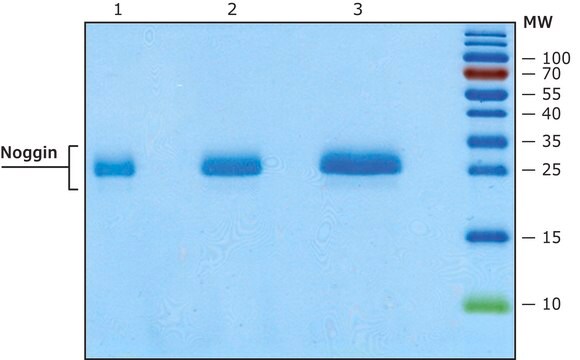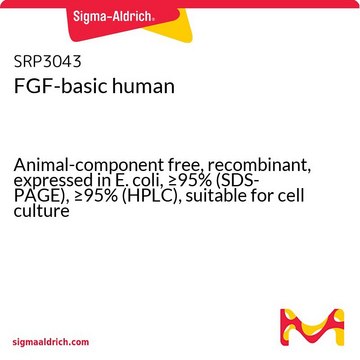SRP3040
FGF-9 human
recombinant, expressed in E. coli, ≥95% (SDS-PAGE), ≥95% (HPLC), suitable for cell culture
Sinonimo/i:
Fibroblast Growth Factor-9, GAF (Glia-activating factor), HBGF-9
Autenticatiper visualizzare i prezzi riservati alla tua organizzazione & contrattuali
About This Item
Codice UNSPSC:
12352202
NACRES:
NA.32
Prodotti consigliati
Origine biologica
human
Ricombinante
expressed in E. coli
Saggio
≥95% (HPLC)
≥95% (SDS-PAGE)
Stato
lyophilized
Potenza
≥2x10^6 units/mg
PM
23.4 kDa
Confezionamento
pkg of 20 μg
tecniche
cell culture | mammalian: suitable
Impurezze
<0.1 EU/μg endotoxin, tested
Colore
white to off-white
N° accesso UniProt
Condizioni di spedizione
wet ice
Temperatura di conservazione
−20°C
Informazioni sul gene
human ... FGF9(2254)
Descrizione generale
FGF9 (fibroblast growth factor 9) is a member of the FGF family, which consists of a minimum of 24 members. This protein is highly conserved across species, and the gene is localized to human chromosome 13q11-q12. In embryos, FGF9 mRNA has a ubiquitous expression pattern. In adults, this protein has a limited range of expression in normal conditions, and expression is usually restricted to brain, kidney and uterus.
Recombinant human FGF-9 is a 23.4kDa protein consisting of 207 amino acid residues.
Recombinant human FGF-9 is a 23.4kDa protein consisting of 207 amino acid residues.
Azioni biochim/fisiol
FGF9 (fibroblast growth factor 9) is expressed in the epithelium and mesothelium of developing lung in the pseudoglandular stage. In developing lungs, it regulates the branching of epithelium, proliferation of mesenchymal cells, and expansion of the lungs. It is overexpressed in patients with idiopathic pulmonary fibrosis (IPF), in regions demonstrating active cell hyperplasia, metaplasia and fibrosis. Thus, it might facilitate the pathogenesis of IPF. The expression of this protein is up-regulated in colon cancer, which is an outcome of hypoxia-induced translational activation.
Sequenza
MAPLGEVGNY FGVQDAVPFG NVPVLPVDSP VLLSDHLGQS EAGGLPRGPA VTDLDHLKGI LRRRQLYCRT GFHLEIFPNG TIQGTRKDHS RFGILEFISI AVGLVSIRGV DSGLYLGMNE KGELYGSEKL TQECVFREQF EENWYNTYSS NLYKHVDTGR RYYVALNKDG TPREGTRTKR HQKFTHFLPR PVDPDKVPEL YKDILSQS
Stato fisico
Lyophilized from 10 mM Sodium Phosphate, pH 7.8 + 50 mM NaCl.
Ricostituzione
Centrifuge the vial prior to opening. Reconstitute in water to a concentration of 0.1- 1.0 mg/ml. Do not vortex. This solution can be stored at 2-8°C for up to 1 week. For extended storage, it is recommended to further dilute in a buffer containing a carrier protein (example 0.1% BSA) and store in working aliquots at -20°C to -80°C.
Codice della classe di stoccaggio
11 - Combustible Solids
Classe di pericolosità dell'acqua (WGK)
WGK 3
Punto d’infiammabilità (°F)
Not applicable
Punto d’infiammabilità (°C)
Not applicable
Scegli una delle versioni più recenti:
Possiedi già questo prodotto?
I documenti relativi ai prodotti acquistati recentemente sono disponibili nell’Archivio dei documenti.
Emily Coffey et al.
The journal of histochemistry and cytochemistry : official journal of the Histochemistry Society, 61(9), 671-679 (2013-06-26)
The fibroblast growth factor (FGF) family of signaling ligands contributes significantly to lung development and maintenance in the adult. FGF9 is involved in control of epithelial branching and mesenchymal proliferation and expansion in developing lungs. However, its activity and expression
Tsung-Ming Chen et al.
Nucleic acids research, 42(5), 2932-2944 (2013-12-18)
Human fibroblast growth factor 9 (FGF9) is a potent mitogen involved in many physiological processes. Although FGF9 messenger RNA (mRNA) is ubiquitously expressed in embryos, FGF9 protein expression is generally low and restricted to a few adult organs. Aberrant expression
Sung Mi Cho et al.
The Journal of biological chemistry, 290(47), 28502-28514 (2015-09-26)
Cyanobacteriochromes (CBCRs), which are exclusive to and widespread among cyanobacteria, are photoproteins that sense the entire range of near-UV and visible light. CBCRs are related to the red/far-red phytochromes that utilize linear tetrapyrrole (bilin) chromophores. Best characterized from the unicellular
Chao Sun et al.
BMC cancer, 15, 333-333 (2015-05-01)
Cancer-associated fibroblasts (CAFs), which reside around tumor cells, are suggested to play a pivotal role in tumor progression. Here we performed microarray analyses to compare gene expression profiles between CAFs and non-cancerous gastric fibroblasts (NGFs) from a patient with gastric
Fibroblast growth factors.
Ornitz, D.M., et al.
Genome Biology, 2, 30051-300512 (2001)
Il team dei nostri ricercatori vanta grande esperienza in tutte le aree della ricerca quali Life Science, scienza dei materiali, sintesi chimica, cromatografia, discipline analitiche, ecc..
Contatta l'Assistenza Tecnica.








